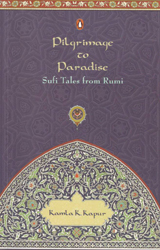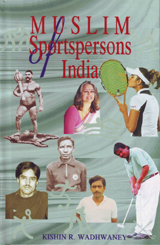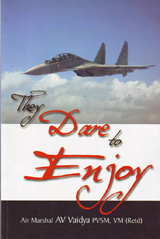|
SHORT TAKES
Reviewed by Randeep Wadehra
Pilgrimage to Paradise: Sufi Tales from Rumi
By Kamla K. Kapur.
Penguin.
Pages: xvi+158. Rs. 200
 RUMI
(aka Jalal-ud-Din Muhammad Balkhi, 1207-1273), Persian mystic and
poet, whose verse is infused with elements of sufism, a movement of
Islamic mysticism, was born in Balkh, in what is now Afghanistan.
Later on, thanks to Mongol invasions, his family was compelled to
migrate to Turkey and settle down in the Sultanate of Rum. In 1247,
Rumi’s friend and religious guide Shams-al-Din, a Sufi darvesh,
disappeared without explanation; he was suspected to have been
murdered by Rumi’s son. Over the years, Rumi composed nearly 30,000
verses of pain at this loss. Rumi’s epic poem Masnavi-e-Manavi
(and not Mathnawi, as Kapur erroneously mentions, for Mathnawi
means "one who claims to have
proof/evidence," while Masnavi is a long poem with
thematic unity) had an enormous influence on Islamic literature and
thought. Rumi’s followers organised a Sufi sect called Mawlaviyah,
also known as the whirling darveshes. RUMI
(aka Jalal-ud-Din Muhammad Balkhi, 1207-1273), Persian mystic and
poet, whose verse is infused with elements of sufism, a movement of
Islamic mysticism, was born in Balkh, in what is now Afghanistan.
Later on, thanks to Mongol invasions, his family was compelled to
migrate to Turkey and settle down in the Sultanate of Rum. In 1247,
Rumi’s friend and religious guide Shams-al-Din, a Sufi darvesh,
disappeared without explanation; he was suspected to have been
murdered by Rumi’s son. Over the years, Rumi composed nearly 30,000
verses of pain at this loss. Rumi’s epic poem Masnavi-e-Manavi
(and not Mathnawi, as Kapur erroneously mentions, for Mathnawi
means "one who claims to have
proof/evidence," while Masnavi is a long poem with
thematic unity) had an enormous influence on Islamic literature and
thought. Rumi’s followers organised a Sufi sect called Mawlaviyah,
also known as the whirling darveshes.
Tawhid
– as has been the norm with Sufi poets and mystics – forms the
thematic essence of Rumi’s philosophy. Yearning for reunion with his
beloved, from whom he has been cut off, remains the leitmotif of his
compositions. This compelling page-turner – which is a rich tapestry
of fables, scenes from everyday life, Koran based exegesis and
metaphysics – provides us with the quintessential Rumi worldview.
Muslim
Sportspersons of India
By Kishin R. Wadhwaney
Siddharth.
Pages: 207. Rs. 500
 Muslim sportspersons
have been doing India proud both before and after Independence. Their
contributions, to individual as well as team events, have been
remarkable. In this region, Gama pehlwan (aka Mian Ghulam
Mohammad) has become a metaphor for a wrestling champ. If Sania Mirza
has caught the nation’s imagination by her exploits in the tennis
court today, one cannot forget Zeeshan Ali – the tennis star of
yesteryear. In hockey and cricket, of course, Muslim stars are a
legion. But their achievements in other sports events too have been
significant. The Arjuna Award winning boxer Mohammad Ali Qamar did
India proud with his exploits in the 2002 Commonwealth Games. There
have been others like the basketball player Abbas Moontasir, the
footballer Syed Abdul Rahim, the golfer Ali Sher, rowers Ismail Baig
and Kasam Khan, table tennis star Mir Kasim Ali and several others in
various disciplines. Muslim sportspersons
have been doing India proud both before and after Independence. Their
contributions, to individual as well as team events, have been
remarkable. In this region, Gama pehlwan (aka Mian Ghulam
Mohammad) has become a metaphor for a wrestling champ. If Sania Mirza
has caught the nation’s imagination by her exploits in the tennis
court today, one cannot forget Zeeshan Ali – the tennis star of
yesteryear. In hockey and cricket, of course, Muslim stars are a
legion. But their achievements in other sports events too have been
significant. The Arjuna Award winning boxer Mohammad Ali Qamar did
India proud with his exploits in the 2002 Commonwealth Games. There
have been others like the basketball player Abbas Moontasir, the
footballer Syed Abdul Rahim, the golfer Ali Sher, rowers Ismail Baig
and Kasam Khan, table tennis star Mir Kasim Ali and several others in
various disciplines.
Wadhwaney has devoted
a separate chapter to India’s Muslim sports journalists. His
painstakingly collected information pertaining to various Muslim
sportspersons, and their brief biographies, should be of immense value
to sports lovers and researchers.
They Dare to Enjoy
By Air Marshal AV Vaidya
Knowledge World.
Pages vii+85. Price 295.
 Smart uniforms, macho
lifestyle and the thrill of zooming across the skies just about sums
up the picture conjured up by the term ‘Air Force’ – the
youngest arm of our military superstructure. Yet to celebrate its
first centenary, Air Force has acquired sophistication that matches
the best of hi-tech entities in the corporate world. But, for most in
the Indian civil society, this military arm is basically a nebulous
entity. For many, the knowledge is limited to watching jets streaking
and spraying the three colours on January 26 every year. Smart uniforms, macho
lifestyle and the thrill of zooming across the skies just about sums
up the picture conjured up by the term ‘Air Force’ – the
youngest arm of our military superstructure. Yet to celebrate its
first centenary, Air Force has acquired sophistication that matches
the best of hi-tech entities in the corporate world. But, for most in
the Indian civil society, this military arm is basically a nebulous
entity. For many, the knowledge is limited to watching jets streaking
and spraying the three colours on January 26 every year.
This slim volume, with a
storyline and a child protagonist, tries to make the common reader’s
perception clearer. While it thrills with the account of IAF’s Sri
Lanka-bound secret mission, the volume briefly outlines the Air Force’s
journey from balloons to supersonic combat aircraft – informing us
how it came into existence; how it was initially used for intelligence
gathering; how it graduated to the role of providing tactical support
to massive military campaigns during the World War; and, finally, how
it has become an effective strategic player in its own right today.
|